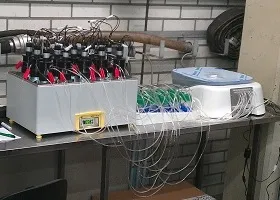Gas production of a digestor at a wastewater treatment plant can be substantially increased by the addition of co-substrates, i.e. by co-treatment of biowastes. Depending on the kind and amount of co-substrate added, gas production can rise so strongly that it becomes possible for plants to become self-sufficient and operate without any external energy inputs. In times of rising energy prices, such increases in energy production are very desirable. Moreover, energy from renewable resources is generated, thereby contributing to climate protection.
Large-scale studies have shown that the degree of degradation and gas production are positively influenced, however the reasons were described up to now only insufficiently. It has been reported that the gas yield of a mixture of different substrates is higher than the sum of the gas yields from the mono-fermentation of the same amount of substrate. Also a stimulative effect on the process stability has been shown. Co-metabolic turnover of wastewater substances which are not degraded during mono-fermentation may also take place.
Within the scope of an extensive measuring campaign at the wastewater treatment plant in Moosburg, mass and energy flows should be investigated (in particular for anaerobic digestion) and a mass balance will be created. Further, accompanying analyses in the lab should quantify the mentioned synergistic effects. With the help of the results and the observed phenomena, the effects of co-digestion on gas production and process stability should be discussed and recommendations will be provided as how best to maximize gas production.
